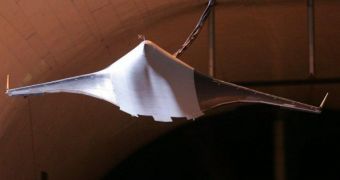As we were telling you in late November, the American space agency is out to develop a new generation of airliners based on advanced concept. Lockheed Martin and Northrop Grumman have already received grants for early studies on the issue, and now the Boeing Company joins their ranks.
NASA decided to award a $5.29 million contract to the Huntington Beach, California-based Boeing, for the development of advanced airliners that could be put into exploitation by 2025.
But the task is not as easy as it may seem. The space agency has a large number of requests that need to be answered if any of the companies want to be the winner of this competition.
Among the mandatory requirements for the new generation of airliners, NASA included increased fuel efficiency, lower fuel consumption, cleaner exhausts, as well as considerably less noise.
The technology that will result from these studies is referred to at the agency as N+2. Experts say that it will be two generations beyond anything in existence today.
What the agency is attempting to demonstrate with these three projects is that fulfilling all of these objectives is possible within a single aircraft. Such an attempt has never been made before.
Lockheed received a $2.29 million contract, whereas Northrop got a $2.65 million one. The companies' respective projects begin this November, and will end up 12 months from now, in November 2011.
Boeing's $5.29-million study will begin this December and will end in December 2011. The company's aircraft will have to be able to operate safely within the modernized air traffic management system.
The new airplanes will need to be able to carry between 50,000 and 100,000 pounds, either in the form of passengers or cargo, at speeds reaching 85 percent that of sound.
They also need to have an average range of about 7,000 miles, which would eliminate the need for detours along the way. Airport pit stops are responsible for the emissions of large amounts of greenhouse gases, which NASA seek to curb.
Given the environmentally-friendly aspect of the study request, the investigations are funded by the NASA Environmentally Responsible Aviation Project.
The main demands listed in the request are reducing emissions and fuel consumption by 50 percent from current levels, and reducing the number of regions subjected to high levels of airport noise by as much as 83 percent.
“The project is part of the Integrated Systems Research Program managed by the agency's Aeronautics Research Mission Directorate in Washington,” NASA says in a press release accompanying the announcement.

 14 DAY TRIAL //
14 DAY TRIAL //